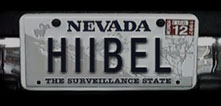Dudley Hiibel's case before the U.S. Supreme Court - if lost - will profoundly change our nation for the worse. What's at stake is our right to live out our lives without fear of the government using the pretext of a demand for I.D. as a justification to violate our Constitutional rights.
We've all seen WW II-era movies where the man in the hat and leather trench coat walks up to someone and demands 'the papers'. A Supreme Court ruling against Dudley Hiibel means this scene from a bad movie becoming a daily reality for Dudley and his 280-odd million fellow American citizens.
Stripped of all the legal jargon, the nine black-robed justices of the Supreme Court need to decide the following Constitutional question.
'Reasonable Suspicion'
When a policeman answers a complaint or sees something amiss, the officer has what is called 'Reasonable Suspicion'. Reasonable Suspicion isn't just a hunch or a sixth-sense kind of thing. There must be a real, clear-cut reason that the cop can tell in court before he can question you. Reasonable Suspicion gives that policeman the legal right to go and ask questions to determine if something really is wrong.

For example, Officer Friendly is walking his beat and sees someone lurking behind an alleyway trash can at 3am. This being odd, he has Reasonable Suspicion that that someone in that alleyway may be up to no good and therefore has the legal right to ask that individual questions and find out what they're up to. This asking of questions is called a 'Terry Stop', so-named after an earlier Supreme Court case involving a man named Terry.
The 'Terry Stop'
Officer Friendly, during a Terry Stop, will ask questions of the citizen in order to determine whether there is 'Probable Cause' for an arrest. 'Probable Cause' means that the officer has determined that the citizen probably has committed a crime and therefore should be arrested. During a Terry Stop, the officer - if he feels threatened - is also allowed to pat down the citizen to make sure the citizen has no weapons on him. This patdown is done for the officer's safety so that he can investigate to see if there is 'Probable Cause' to arrest the citizen without fear of the citizen harming the officer. Reasonable Suspicion is not enough to arrest: the officer must have Probable Cause.
From 'Reasonable Suspicion' to 'Probable Cause'
In Dudley Hiibel's case, Deputy Dove was sent out to investigate a domestic disturbance call. Clearly he had 'Reasonable Suspicion' to investigate the situation. But how did he investigate the call once on the scene? All he did was repeatedly demand Dudley Hiibel produce his ID.
Did he talk to Mimi, the supposed victim? No.
Did he check to see if she was injured? No.

- Humboldt County Deputy Lee Dove
Did he feel threatened? No.
All Dove did was repeat his demand to Dudley for 'the papers'. Dudley could have no possible idea that someone reported a domestic disturbance. All Dudley knew was that one minute he was smoking a cigarette and the next minute there was a man with a badge demanding he show his ID.
Deputy Dove arrested Dudley because he believed Dudley's refusal to show ID was 'Probable Cause' for an arrest.
Freedom begins with saying 'no', and for saying just that, Dudley Hiibel spent the night in jail and got fined 250 dollars.
Is Refusal to Show ID 'Probable Cause'?
This is the crux of the issue before the Supreme Court. Dudley Hiibel believes it isn't because of that pesky old Bill of Rights. Let's review a couple of those rights, shall we?
The Fourth Amendment
The right of the people to be secure in their persons, houses, papers, and effects, against unreasonable searches and seizures, shall not be violated, and no warrants shall issue, but upon probable cause, supported by oath or affirmation, and particularly describing the place to be searched, and the persons or things to be seized.
The Fifth Amendment
No person shall be held to answer for a capital, or otherwise infamous crime, unless on a presentment or indictment of a grand jury, except in cases arising in the land or naval forces, or in the militia, when in actual service in time of war or public danger; nor shall any person be subject for the same offense to be twice put in jeopardy of life or limb; nor shall be compelled in any criminal case to be a witness against himself, nor be deprived of life, liberty, or property, without due process of law; nor shall private property be taken for public use, without just compensation.
In other words, Dudley Hiibel was unreasonably searched and seized because he refused to show his ID. The argument that not showing ID makes for 'Probable Cause' is not only laughable, but clearly un-Constitutional. In addition, the mandatory showing of ID is nothing less than compulsory self-incrimination, which also flies in the face of the Bill of Rights.
Safety
In this post-9/11, War on Terrorism America of ours, there are those who want us to sacrifice our liberty for safety. One of the arguments made in favor of refusing to show 'the papers' an arrest-able offence is that the police need to know who they are dealing with when they are conducting an investigation. Although this sounds reasonable so long as you don't think about it too hard, showing one's ID on demand to the police is something that is ripe for abuse.
Do we want to live in a society where the police are conducting background checks whenever a citizen is merely suspected of possibly doing something wrong?
What else does a police officer need to know in order to feel safe while he asks you questions? Your medical history? Perhaps a DNA sample would be in order. Home ownership status? Your tax records?
Clearly what your ID says (assuming you have one) has no bearing on a Terry Stop. We have no National ID Card and therefore the idea that we're supposed to have any 'papers' to show in the first place is un-American. The police already have the power to pat down someone who is Terry Stopped if they feel threatened... what else do they possibly need to know in order to conduct a Terry Stop? The Terry Stop is not supposed to be a fishing expedition, but a legal way for the police to see if there is anything worth investigating to start with.
A policeman's seeing one's ID isn't making anyone any safer. It is however an invasive search of one's person that violates the very heart of the 4th and 5th Amendments to the U.S. Constitution.
If we allow demagogues to change the very nature of the way we live so long as they shout '9/11' or 'terrorism' as they strip us of our rights, then we all lose and the bad guys win. As Benjamin Franklin clearly pointed out over two centuries ago, "They that can give up essential liberty to obtain a little temporary safety deserve neither liberty nor safety."
